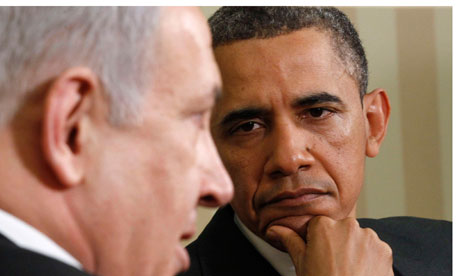Netanyahu’s rejection of Obama’s 1967 border deal leaves peace talks in tatters
![]()
Netanyahu’s rejection of Obama’s 1967 border deal leaves peace talks in tatters
Palestinians describe fresh talks as pointless following Israel’s dismissal of Barack Obama’s call for a return to prewar frontier
Peter Beaumont
US president Barack Obama listens to Israel’s prime minister Binyamin Netanyahu during talks at the White House last week. Photograph: Jim Young/Reuters
Senior Palestinian officials declared peace negotiations with Israel were “pointless” after the Israeli prime minister, Binyamin Netanyahu, rejected Barack Obama’s call to base Middle East border talks on the pre-1967 war lines.
Amid growing evidence of a deepening crisis in the stalled peace process, Fatah officials also indicated that they would defy Obama’s calls not to seek UN recognition of Palestine as an independent state – a move that the US president has warned against following Fatah’s reconciliation with the Islamic militant organisation Hamas.
The comments from Nabil Shaath and Saeb Erekat, both aides to Palestinian president Mahmoud Abbas, follow the rejection by Netanyahu of Obama’s call for a Palestine based broadly on pre-1967 borders.
Instead, Netanyahu has said that Israel views the US proposal as “unrealistic” and “indefensible”. Underlining its rejection last week, on the eve of Netanyahu’s visit to Washington, Israel announced it intends to build 1,500 new housing units in east Jerusalem.
The Palestinian remarks came as it emerged that Obama’s border proposal had the backing of the UN, the EU and Russia – leaving Netanyahu increasingly isolated in his hawkish stance.
-
Prospects of any meaningful resumption of peace talks have become more distant in recent weeks as the two main Palestinian factions, Fatah and Hamas, signed a deal to end the long-running tensions between them, and Israel insisted it cannot negotiate with a government which includes Hamas.
Abbas has not given his official response to the parameters for a Middle East peace deal that Obama laid out, and it remains unclear whether the Palestinian leader would now consider abandoning the UN bid.
Since the speech, Abbas has been consulting by phone with Arab leaders. He was due to meet with Jordan’s King Abdullah II and then convene the leaders of the PLO and his Fatah movement later in the week before giving a response, Erekat said.
In his speech, Obama said that border talks must be held on the basis of Israel’s frontiers in 1967, before it captured the West Bank, Gaza and east Jerusalem.
The Palestinians want to establish their state in the territories Israel has occupied since that war. Recognition of the 1967 line as the starting point, while allowing for mutually agreed land swaps, has been a long-standing Palestinian demand.
A US official, speaking on condition of anonymity, said endorsing the pre-1967 ceasefire line was done in the hopes of dissuading the Palestinians from going ahead with their UN plan. Obama warned in his speech that their UN bid would be pointless and said he expected more explanation from Abbas about his reconciliation with Hamas, which refuses to recognise Israel.
Erekat said Netanyahu’s statements make it clear the Israeli leader is not a partner for peace, suggesting there is no point in returning to negotiations.
“I don’t think we can talk about a peace process with a man who says the 1967 lines are an illusion, that Jerusalem will be the capital of Israel, undivided, and he does not want a single [Palestinian] refugee to go back,” Erekat said. “What is left to negotiate?”
Erekat said it was too soon to say whether the Palestinians would still seek UN recognition in September. A bid to become a UN member requires approval not just from the general assembly, where the Palestinians might win the majority needed, but also from the UN security council, where the US might veto such a step.
However, Shaath said: “We will escalate our diplomatic efforts to get the recognition of the Palestinian state.” He noted that Obama had not threatened a veto: “We still hope that he will not do so, and that he will not stand in our way to freedom and independence, which he called for all the Arab nations.”
Related Articles
Hospital Poem in a time of War
![]()
Al-Shifa Hospital, where the Israeli soldiers said “come out with your hands on your head” to the amputees and the drunken wheelchairs, drunk on grief and terror. Gaza hospitals: all bombed, besieged, broken, burnt, bulldozed, destroyed…
Fatah: PA to seek full recognition at UN
![]()
Palestinian Authority will ask Security Council for full recognition next week, Fatah official Mohammed Shtayyeh says Abbas will file the
Tearing the Veil From Israel’s Civility
![]()
Gilad Atzmon’s “The Wandering Who” by WILLIAM A. COOK Gilad Atzmon’s insight into the organism created by the Zionist movement



